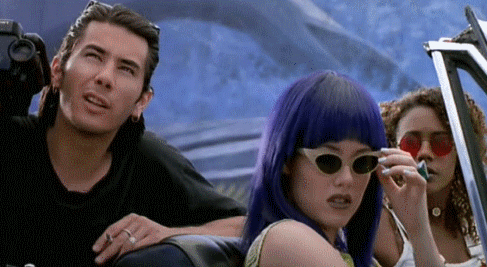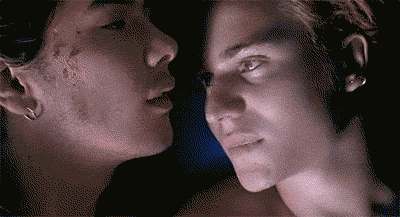Welcome back to The 90-Minute Movie! Or just welcome in general if it’s your first time. I have some new followers off of TikTok and I am really grateful you’re here. Think of this newsletter as your friend’s apartment where you can geek out about movies -- but no one’s going to admonish you for not sitting through the slogs that are The Irishman or Oppenheimer. (I still haven’t seen either…) If you think there is someone in your life who would enjoy this too - please share it with them!
This week I’m talking about one of my favorite 90’s movies (high praise!), 1997’s Nowhere by Queer icon Gregg Araki. Nowhere (82 minutes) is the third entry into Araki’s Teenage Apocalypse trilogy. There are arguments to be made about which is the best of the three but Nowhere holds a special place in my heart, even if I was only 10 years old when it came out. (Sometimes I wonder if mentally I am a Gen-Xer stuck in a Millennial’s body.) Nowhere came to me at the time it should - my early twenties - a time when everything is heightened and confusing and sexual and loud. I only wish I had heeded some of its “advice” more than I did. But I guess that’s the point of being young and dumb.
Nowhere follows Dark (James Duvall at his peak) on what starts out as a fairly typical day for him. He is yelled at by his mother (an excellent cameo by Beverly D’Angelo) and then decides to skip class, edit his documentary and grab food at the Hole with his girlfriend Mel (Rachel True), her girlfriend Lucifer (whom Dark hates and hates sharing Mel with), and a whole host of characters played by now recognizable faces (Christina Applegate, Scott Caan, Debi Mazar etc.) Dark is our center point but we branch out and experience the day via the lives of his inner and outer circle (Ryan Phillippe, Heather Graham, Rose McGowan, Mena Suvari, Shannen Doherty) as they each come to terms with low and extremely high stakes situations. The movie culminates (like all great 90’s movies do) at a massive party where things come to a head for just about every character.
This movie isn’t for everyone. I’ll start there. Often I cover movies that I truly believe anyone could watch and enjoy. That’s not Nowhere. But I do think it is a movie everyone should try to watch because of its significance as a cultural artifact. Plenty of 90’s movies capture the zeitgeist, but few feature Queer characters-- and none do it in the honest and beautiful way Araki does. Like any movie from another time, there are moments of Nowhere that are questionable (the violent rape is one that is particularly tough for me) but Araki himself recognizes and owns that. Things change, people grow, art changes, art grows.
What I have always found so engaging about the narrative of Nowhere is the matter-of-fact way it handles sex and sexuality. Monogamy and non-monogamy. The characters are exploring freely in a way that a lot of young people are not afforded. I think that is why this movie has so much staying power. It doesn’t matter what decade you watch it in, sex is always going to be present and the navigation of your sexual life as a young adult is always pivotal. That will never change. I guess what I am getting at is that Nowhere is the Everybody Poops for sex and twentysomethings.
And not only that but it’s a beautiful film. I was pretty excited to learn last year that it was finally getting a 4K released because for YEARS it has been hard to find anywhere (hard copies + streaming alike) now we can all finally watch it how it was intended to look. Like a lot of my favorite films, Nowhere borrows from German Expressionism. This is actually kind of a weird phenomenon for me because I love movies that reference this (The Night of the Hunter, Cool As Ice) but am not an expert or fan of the originals. (Maybe I’m a fake?) I love the sharp angles, unnatural angles, and lots of height in the frame. Araki is also playful, however, softening this rather harsh style of film. There are bedrooms filled with plastic flowers unironically, windows that look out at paintings, and tender close-ups. The LA of Nowhere is heightened, a spectacle, a show.
Araki movies belong to the young. In both their surrealist style and youth culture soundtracks, but also at the heart of their stories. Nowhere is about confusion and sexuality, about finding your place emotionally when you’re physically tied to a location. (A frustration I know most young people feel.) It’s actually kind of crazy to acknowledge that at only 82 minutes Nowhere manages to tackle difficult subject matter like suicide, rape, non-monogamy, and drug addiction-- and does it pretty well. There’s of course, always room for improvement, but I’m not going there. Instead, I am choosing to bask in its reality and enjoy the visual serving of surrealism.









I tried watching this movie about a year ago when someone recommended it to me and almost couldn't get through it. As you note, I'm sure there is an audience for it, but I'm not that audience.